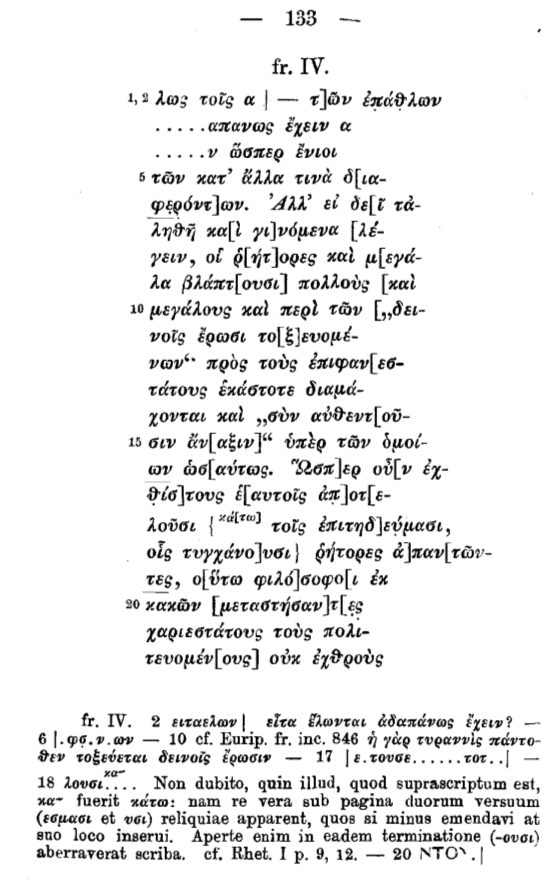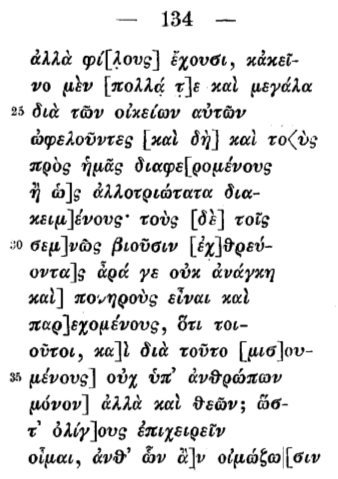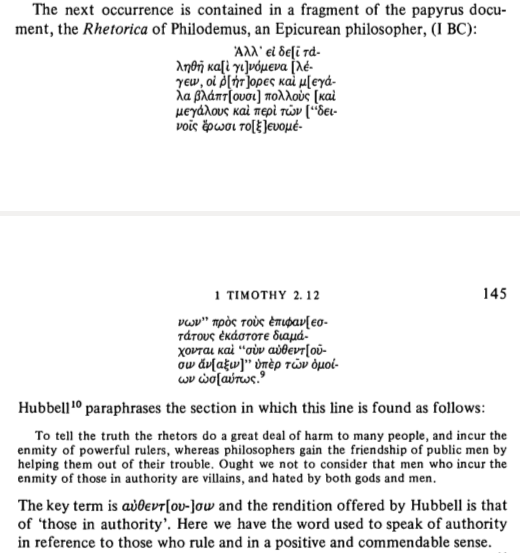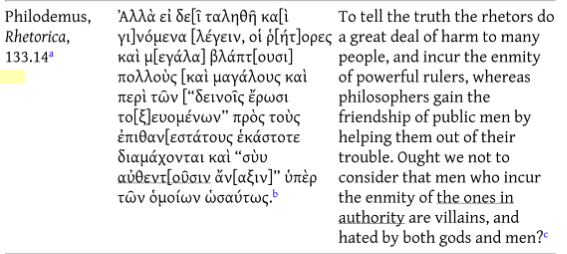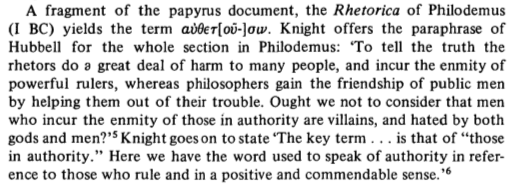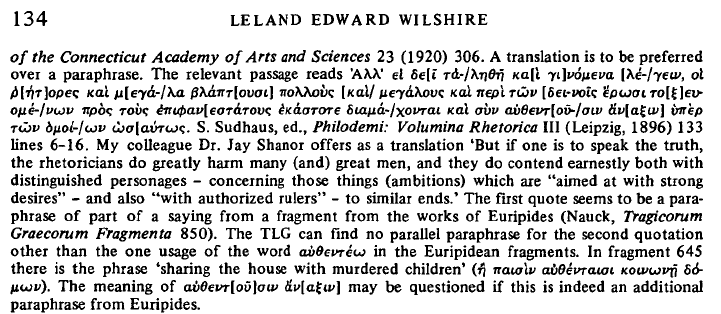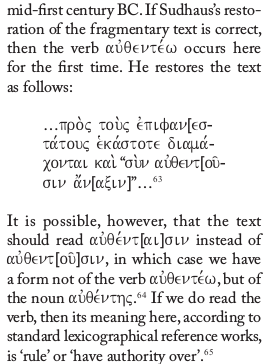Here is the fragment, dated to the mid-first century BC, in Sudhaus’s edition [Philodemus, Rhet. 2.133, S. Sudhaus (ed) Philodemi Volumina Rhetorica (Leipzig 1896) pp. 133-4]:
The phrase in question, σὺν αὐθεντ[οῦ]σιν ἄν[αξιν] is at line 14-15. If the reconstruction, αὐθεντοῦσιν, is correct, then we have a present tense masculine/neuter dative plural active indicative participle of αὐθεντέω. ἄναξιν is heavily reconstructed, but seems to be generally accepted. It is the dative plural of ἄναξ, ἄνακτος, ὁ, meaning a ‘lord’, ‘master’. So they agree in case and gender and number.
Here is Knight (1984, and see here for this and subsequent papers with their citations) on this text:
Knight was mistaken in thinking that ‘those in authority’ corresponded to αὐθεντ[οῦ]σιν ἄν[αξιν] in Hubbell’s paraphrase. Hubbell has attempted to give the sense of the whole fragment in just two sentences. One can see ‘hated by both gods and men’ at lines 34-36, corresponding to μισουμένους οὐχ ὑπ’ ἀνυρώπων μόνον ἀλλά καὶ θεῶν (‘hated not only be men but also by gods’), so the relevant section of the Greek text must be shortly before that. In fact, τοὺς δὲ τοῖς σεμνῶς βιοῦσιν ἐχθρεύοντας, could mean something like ‘those who are at enmity with those who live in an august and worthy manner (σεμνῶς)’; which is quite close to Hubbell’s ‘men who incur the enmity of those in authority’, I think.
This mistake is still to be found in the footnotes (at p. 203) to Baldwin’s chapter on Αὐθεντέω in the 2005 second edition of Women in the Church, edited by Kostenberger and Schreiner. Here he offers Hubbell’s paraphrase of the entire text (lines 6-36 at least), alongside a much shorter section of the Greek text (lines 6-16), as if one were a translation of the other:
(Incidentally, the Greek text has been garbled somewhat, with μαγάλους instead of μεγάλους, ἐπιθανεστάτους in place of ἐπιφανεστάτους, and σὺυ where σὺν should be..)
Wilshire (1988) also quoted Knight, again apparently without finding the mistake:
However, in footnote 6 Wilshire offers a translation by Dr Jay Shanor which does correspond to the correct part of the text:
I do not understand how Shaynor can translate σὺν αὐθεντ[οῦ]σιν ἄν[αξιν] as ‘with authorized rulers’, since αὐθεντ[οῦ]σιν is active. Surely it would mean something like ‘governing masters’ or ‘ruling lords’, would it not?
At the end of the footnote, Wilshire raises another issue. There is a possibility that αὐθένταισιν is the correct reading, in which case it would be the dative plural of the noun αὐθέντης. Here is Wolters (2006) on this text:
Some readers (as I was) may be wondering how two nouns can be together like this without a conjunction. One possible answer comes from the fact that there are at least two texts where αὐθέντης serves as an adjective. Two from Aeschylus are given in Liddell and Scott:
and it can can be seen that in both cases αὐθέντης, combined with words for murder or death, expresses murder by one of the same family. If the purpose of the adjective is primarily to convey the idea of kinship, then it is hard to see what the meaning might be if it were used with ἄναξιν in the Philodemus text.
There is however one case when αὐθέντης appears at first sight to be used as an adjective to modify persons rather than death or murder. This is Euripides Fragment 645, which Wilshire refers to in his footnote above. He gives the meaning of ‘ἢ παισὶν αὐθένταισι κοινωνῇ δόμων’ as ‘sharing the house with murdered children’. This looks impossible to me. How can the noun/adjective αὐθένταισι have the passive sense ‘murdered’? Here is the entire text of the fragment from the Nauck edition:
συγγνώμονάς τοι τοὺς θεοὺς εἶναι δόκει,
ὅταν τις ὅρκῳ θάνατον ἐκφυγεῖν θέλῃ
ἢ δεσμὸν ἢ βίαια πολεμίων κακά,
ἢ παισὶν αὐθένταισι κοινωνῇ δόμων.
In a discussion at textkit.com, the following translation was offered:
‘Consider the gods to be forgiving
when someone wishes, by an oath, to flee death
or prison [δεσμὸν] or the violent evil deeds of enemies at war [not ‘evils of war’ which would be πολέμων]
or shares a household with offspring who are murderers.’
The last line could possibly be: ‘or is together with [κοινωνῇ] offspring who are murderers of one’s family [δόμων].’
αὐθένταισι is translated as a noun in apposition to παισὶν. The Loeb Classical Edition has a slightly different text, with τοῖσιν instead of παισὶν, which removes any possibly difficulty in translating αὐθένταισι again as a noun meaning murderers.
There do not therefore seem to be any examples of αὐθέντης used adjectivally with persons, or indeed with anything other than death and murder. In a prepositional phrase like σὺν αὐθέντ[αι]σιν ἄν[αξιν], could these be two nouns in apposition? I am not sure. Perhaps if this is poetry, and this is a quotation, as the editor has it, they could be. ἄν[αξιν] is in the Homeric style. Either σὺν αὐθεντ[οῦ]σιν ἄν[αξιν] or σὺν αὐθέντ[αισ]ιν ἄν[αξιν] could be the second part of a hexameter (they both scan correctly).
In Jay Shanor’s translation the rhetoricians are harming and contending with three groups of distinguished men. First, there are the μεγάλους, the great ones. Second, there are the ἐπιφανεστάτους, (Liddell and Scott: ‘of men, conspicuous, notable, distinguished by rank’). Third there are the αὐθεντ[οῦ]σιν ἄν[αξιν]. There is no hint here that these lords are being portrayed in a negative way. On the contrary, they are put together with the great and the illustrious.
However, it may be doubted whether in Greek, the preposition σύν may be used of fighting against someone. In English, we can say ‘fighting with’ to mean fighting against, but is this possible in Greek? Liddell and Scott give the meaning of σύν τινὶ μάχεσθαι as being to ‘fight at his side’. Is it therefore, that the rhetoricians are fighting against the great ones and the notable ones, but with the αὐθεντ[ ]σιν ἄν[αξιν]? If so, then perhaps a meaning like ‘murderous lords’ becomes possible.
It seems certain that Sudhaus is justified in putting [„δει]νοῖς ἔρωσι το[ξ]ευομένων“ in quotation marks, since it so close to this text from Euripides, Fragment 850 [Nauck, Tragicorum Graecorum Fragmenta, 1889, p.637]:
ἡ γὰρ τυραννὶς πάντοθεν τοξεύεται δεινοῖς ἔρωσιν, ἧς φυλακτέον πέρι.
This, in conjunction with the occurrence of παισὶν αὐθένταισι in Euripides Fragment 645, increases the likelihood that σὺν αὐθεντ[ ]σιν ἄν[αξιν] is also a quotation from, or an allusion to, Euripides. Euripides lived in the 5th century BC, so he can hardly have used αὐθεντέω, which is not attested until four centuries later. Could he have used αὐθέντης to mean ruler rather than murderer? By a curious coincidence, the single occurrence of the word with this meaning is also in Euripides, in Suppliants 442:
καὶ μὴν ὅπου γε δῆμος αὐθέντης χθονός
which has been translated as:
Again, where the people (δῆμος) are absolute rulers (αὐθέντης) of the land (χθονός).
Academic opinion, however, seems to be strongly against this text being authentic. See for example:
David Kovacs, ‘Tyrants and Demagogues in Tragic Interpolation’, Greek, Roman, and Byzantine Studies 23/1 (1982) 31-50, at 36-7
Conclusion
In conclusion, it seems to me that the most important question to ask is whether σὺν αὐθεντ[ ]σιν ἄν[αξιν] is a quotation or not. In favour is: 1) that δει]νοῖς ἔρωσι το[ξ]ευομένων seems certainly to be a near quotation from Euripides; 2) the fact that σὺν αὐθεντ[ ]σιν ἄν[αξιν] scans as the second part of a hexameter; 3) the Homeric style of ἄν[αξιν].
Against is: 1) the fact that no such quotation is known; 2) the awkwardness of having two nouns in apposition in this way, it seeming more natural to have a participle modifying ἄν[αξιν] adjectivally.
Finally, it may be pointed out that the reconstruction of ἄν[αξιν] is based on the first two letters only, and can hardly be more than a reasonable conjecture. A different reading for that word would affect the likelihood of this being a quotation or not, and of αὐθέντ[αι]σιν being correct rather then αὐθεντ[οῦ]σιν. Overall, as things stand, there is too little certainty about the true reading of αὐθέντ[ ]σιν for the Philodemus text to be of more than marginal value in elucidating the meaning of αὐθεντέω in the koine period.
Andrew
